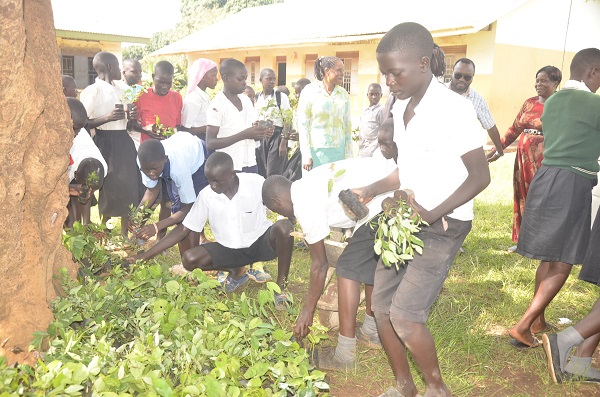MASINDI-As one way of inculcating the culture of conserving the environment amongst citizens, Umoja Conservation Trust [UCT]has embarked on its campaign to plant trees in schools in Masindi district.
Brian Toshi Bwana, one of the trustees of UCT says the organisation in partnership with other stakeholders, wants to plant more trees in all government primary schools in Masindi district.
“We are doing this in partnership with Africa Kwetu. We have dubbed the campaign “60 million trees for Uganda at 60 years of independence,” Toshi told this reporter toward the end of last week while launching the campaign at Karujubi Primary School in Masindi Municipality.
He said Ugandans need to grow more trees. We are calling upon everyone to join this campaign. We want to inculcate the culture of planting trees in school children such that they can grow up knowing the significance of conserving the environment,” said Toshi.
During the launch of the campaign, over 2000 tree seedlings of different species were distributed by National Forestry Authority [NFA] and planted by a team from Africa Kwetu Tour, UCT, and the pupils of Karujubi Primary School.
Toshi noted that the campaign to plant trees in schools across the country will go on until the target is achieved.
“We are putting much emphasis on planting trees which are environmentally friendly like fruit and medicinal trees,” he said they are planting Bamboo, coffee, jack fruits, mangoes, Prunus Africana among others.
He said as the country prepares to drill oil from the Albertine Grabben, there is a need to plant more trees to combat the carbon emissions from the oil machinery.
Katende Mukiibi the coordinator Africa Kwetu Tour called upon every stakeholder to be part of the campaign to plant trees, especially in the areas where they were cut down.
Irene Nyamigusa, the head teacher of Karujubu Primary School welcomed the idea of planting trees in schools, noting that most of the schools don’t have shades as well as windbreakers.
She said some schools have had their roofs blown off by wind due to the lack of trees around the protecting the environment. “Taking this campaign to children is important since they don’t easily forget what has been taught to them,” said Nayamigisa.
Human activities responsible for loss of the forest cover
Anthony Akoko, the assistant forest officer Masindi district said the district continues to lose forest cover due to human activities.
“We are losing 10 hectares of forest cover every annually due to different activities like sugarcane growing and other farming activities. For instance, in the Greater Kijujubwa Sub-county, cattle keepers are cutting down big trees and leaving the small ones as they open up land for grazing.
He said much of the destruction of trees is in unprotected areas. “In the protected areas there is minimal interference,” said Akoko.
What’s being done
Akoko noted that apparently, the local leadership has organised the communities into associations to manage the forests which had no owners.
“We have 10 community forests which are being managed by these associations. We demarcated them and the association members cannot allow anyone to encroach on them. I am encouraging the community members to identify more forests such that they are demarcated,” Akoko said.
He further said that the district in the year 2016 passed a tree planting policy stipulating that trees be planted at every function be it at the district, community, or individual level, adding that the people in the district have embraced it.
Akoko also said that they give out tree seedlings as a local government for the people to plant.
“I am encouraging the people of Masindi to continue applying for these seedlings. We plant 60,000 trees every planting season. In a year we plant about 120,000 trees. We are ready to support the initiative which has been brought by Umoja Conservation Trust since it falls in our docket,” he said.
https://thecooperator.news/masindi-authorities-partners-to-plant-30000-trees-in-schools/
Buy your copy of thecooperator magazine from one of our country-wide vending points or an e-copy on emag.thecooperator.news
